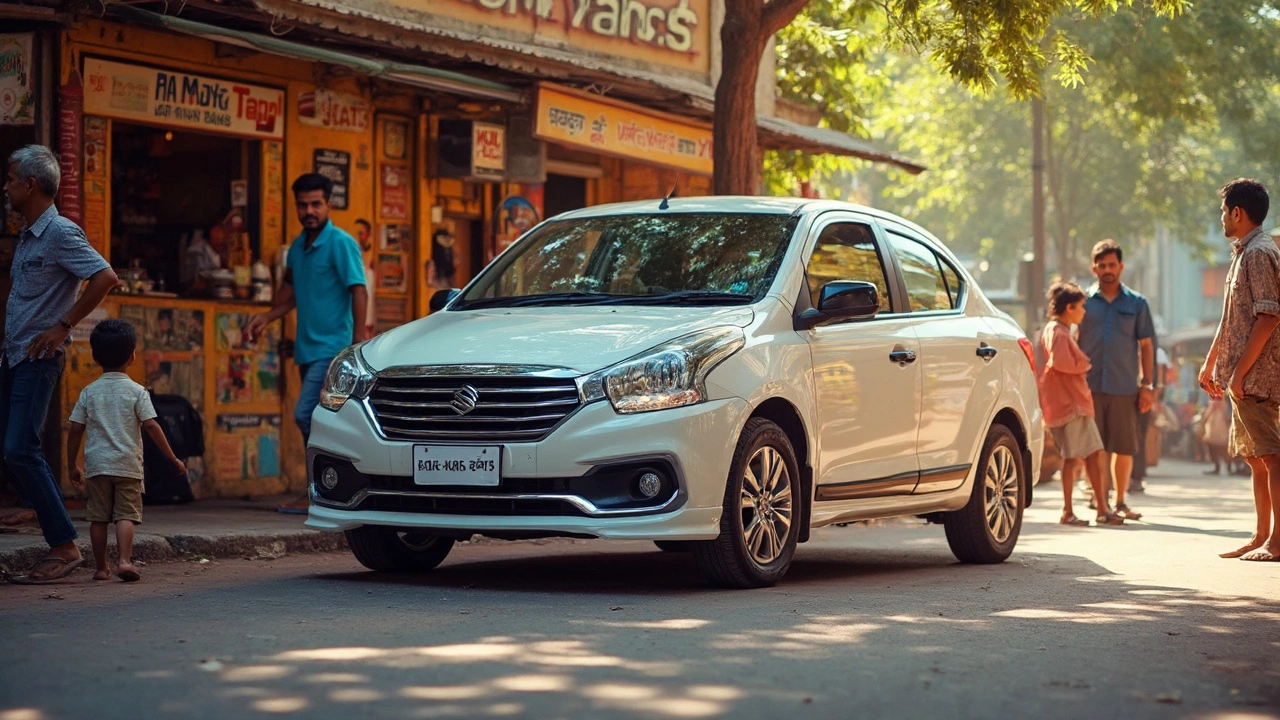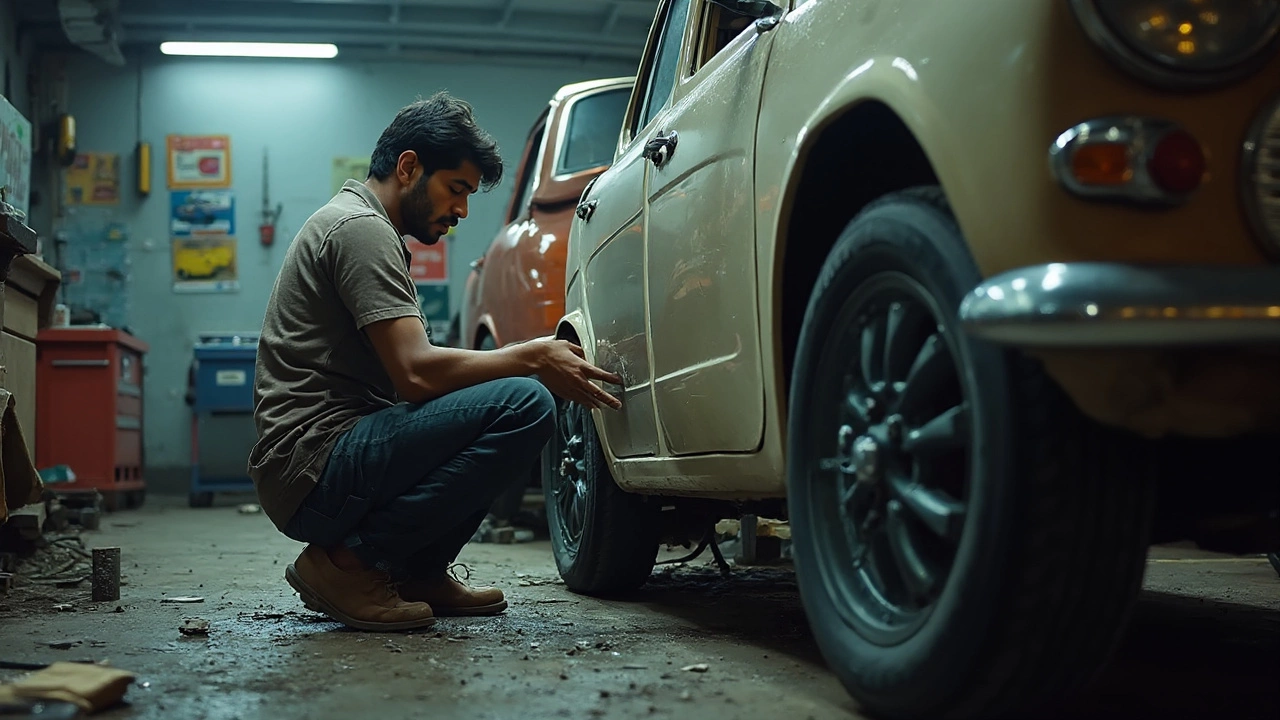 May, 23 2025
May, 23 2025
So, you're thinking about swapping those basic steel wheels for something flashier or maybe just lighter. Alloy wheels always seem to pop up on car ads and at the dealership, promising better looks and performance. But are they really worth all the buzz—and your extra money?
The instant upside to alloy wheels is pretty obvious just by looking at them. Most folks want their car to stand out, and a sharp set of alloys completely changes the vibe. They come in all sorts of eye-catching designs, usually far better looking than plain steel wheels. But don't get stuck on looks alone—there's more going on than meets the eye.
If you're driving a lot, especially on rough roads or curvy backroads, it's not just about style. Lighter wheels can mean better handling, less stress on your car's suspension, and even a small bump in fuel economy. Still, before you shell out hundreds or even thousands, let’s look at what you’re really buying when you put your cash on alloy wheels. The pros, the cons, and whether the upgrade fits your driving style or is just another flashy add-on.
- What Makes Alloy Wheels Different?
- Performance vs. Style: Breaking Down the Benefits
- Are There Any Hidden Downsides?
- Are Alloy Wheels the Right Choice for You?
What Makes Alloy Wheels Different?
Most standard cars roll out of the factory with steel wheels. They're strong, reliable, and cost less, but nobody’s ever complimented a set of basic steelies. Alloy wheels are a totally different animal, built from a mix of aluminum (sometimes with magnesium or nickel added). This blend makes them lighter and sometimes even tougher than their steel cousins.
Here’s what sets alloy wheels apart:
- Weight: Alloy wheels typically weigh about 20-30% less than steel wheels. Less weight means less work for your suspension and better handling, especially in tight corners.
- Heat Dissipation: The metals and design help shed heat from your brakes faster, which can mean fewer problems with brake fade, especially when you’re doing a lot of stop-and-go driving or heading downhill.
- Design Choices: Thanks to the casting process, alloy wheels can come in all kinds of designs, so there’s a style out there for just about everyone.
- Corrosion Resistance: Aluminum alloys are less likely to rust compared to steel, which is a big win if you’re fighting winter road salt.
Let’s get specific. Check out how standard steel wheels and alloy wheels stack up on the stuff that matters most:
| Feature | Steel Wheels | Alloy Wheels |
|---|---|---|
| Average Weight (per 17" wheel) | ~25 lbs | ~18 lbs |
| Brake Cooling | Okay | Much better |
| Corrosion Resistance | Prone to rust | Resistant to rust |
| Style Choices | Very limited | Huge variety |
| Cost (per wheel) | $60–$120 | $120–$500+ |
Beyond the numbers, think about your daily drive. If you live somewhere with brutal winters and lots of road salt, or you really value how your car looks, alloy wheels might check more boxes for you. If you’re just looking for something cheap and bulletproof, steel does the job. It's all about what matters most for your car and your wallet.
Performance vs. Style: Breaking Down the Benefits
Switching to alloy wheels isn’t just about giving your car some curb appeal—there are real benefits that show up out on the road. The biggest selling point? Alloy wheels are made from materials like aluminum mixed with a bit of other metals. This makes them lighter than old-school steel wheels, and that difference affects more than you’d expect.
The lighter weight means your car needs less effort to get rolling and to stop. This can shave precious seconds off your braking distance and make your steering feel snappier. A study by the Society of Automotive Engineers found that dropping 10 pounds of wheel weight on each corner could trim up to 0.2 seconds off your 0-60mph time. Not everyone races their car, but better acceleration and easier handling matter to anyone who drives.
Here’s how alloy wheels stack up:
| Feature | Alloy Wheels | Steel Wheels |
|---|---|---|
| Weight (avg. per wheel) | 15-20 lbs | 20-25 lbs |
| Cooling (heat dissipation) | Excellent | Good |
| Custom designs | Wide variety | Mostly basic |
| Corrosion Resistance | Better, but can corrode if scratched | Prone to rust |
But let’s face it, style drives a lot of the interest. No one ever snapped a picture of plain steel wheels and called their friends. Alloy wheels come in all kinds of finishes—matte black, brushed silver, even two-tone—so you pick the vibe that fits your car and your personality. Ever notice how high-end brands almost always use alloys? That’s because wheels make or break the whole look.
- If you want better performance, especially on curvy roads or in spirited driving, lighter alloys make a real difference.
- If you care about resale value, a set of decent alloys can actually bump up how much buyers are willing to pay.
- Alloy wheels cool off faster after heavy braking than steel, helping prolong brake life and cut down on fade during stop-and-go traffic.
Of course, if you just want something tough for hauling through potholes and winter storms, you might stick with steel. But if your car is something you actually take pride in—something you want to perform and look better at the same time—that’s where alloys earn their price tag.

Are There Any Hidden Downsides?
Alloy wheels sound like the perfect upgrade, but let’s not ignore the stuff people don't always mention. They aren’t flawless. There are a few practical issues that could catch you off guard if you’re not ready for them.
First up, durability. While alloys are lighter than steel, they're easier to crack or bend on rough roads or from hitting a deep pothole. Unlike steel wheels that can usually take a knock and just get a little dented, a hard impact can crack an alloy wheel for good. Locksmith-grade repairs? Not really a thing—cracks often mean you have to buy a whole new wheel.
Another thing—cost. Not just up front but in the long run. Damaged alloy wheels are pricey to replace, often two to four times as much as a steel wheel. Plus, if you do curb one or scratch it, those paint touch-ups aren’t cheap, especially if you want it to look factory new.
- Alloy wheels are easier to scratch or chip compared to steel.
- Repairs, when possible, don’t always restore full strength, so safety might be a concern.
- They can be a magnet for theft, especially with some flashy designs, so you might want to think about locking lug nuts or even adding wheel locks to your car insurance.
Salted winter roads? That’s another headache. Alloys are more likely to corrode from road salt than steel. The finish can flake or bubble after a couple of harsh winters unless you’re into regular cleaning and protection. Here’s a quick look at how the costs shake out over five years for common repairs and replacements:
| Wheel Type | Average Replacement Cost (per wheel) | Average Repair Cost | Corrosion/Finish Issues |
|---|---|---|---|
| Alloy | $300-$600 | $100-$200 | Moderate to High |
| Steel | $80-$150 | $40-$80 | Low |
In short, while you’re getting an upgrade in style and performance, just factor in a little extra care—and some emergency funds—in case life throws a pothole your way.
Are Alloy Wheels the Right Choice for You?
Deciding if you should spend your cash on alloy wheels comes down to how you use your car, your budget, and what really matters to you—performance, looks, or both. Not every driver needs to upgrade, so you'll want to weigh the pros and cons for your situation.
- If you care about style, alloys are hands down better than standard steel. They'll boost your car's appearance for sure.
- If performance matters—maybe you love twisty roads or you just want a little better handling— the lighter weight of alloys can actually make a difference, making steering feel quicker and more precise.
- If you mostly drive in places with harsh winters, salty roads, or tons of potholes, you might want to think twice. While newer alloys are better than older ones, they’re still more likely to crack or get damaged than steel if you hit a deep pothole.
- Looking to get a bit better gas mileage? Saving even a few pounds per wheel helps. Some tests have shown a 2-5% bump in fuel economy with alloys compared to steel wheels of the same size—though don't expect miracles.
Here’s a simple breakdown comparing steel vs. alloy wheels to help you decide:
| Category | Alloy Wheels | Steel Wheels |
|---|---|---|
| Weight | Lighter (improves performance) | Heavier (not great for handling) |
| Looks | More stylish, lots of options | Plain, basic designs |
| Durability | Can crack from hard hits | Usually bends instead of cracking, easier to fix |
| Price | Pricier upfront (from $400 for a set into the thousands) | Cheaper ($200+ per set) |
| Corrosion Resistance | Better now, but not invincible | Painted/coated, overall tougher in salty winter roads |
If budget’s tight, steel is practical. But if you’ve got a little extra to spend and want your car to look and drive better, alloy wheels might feel worth every penny. Just remember to factor in wheel care, especially if you’re in an area with rough roads or long winters. And always buy from a reputable shop—cheap "knock-off" alloys don’t hold up.